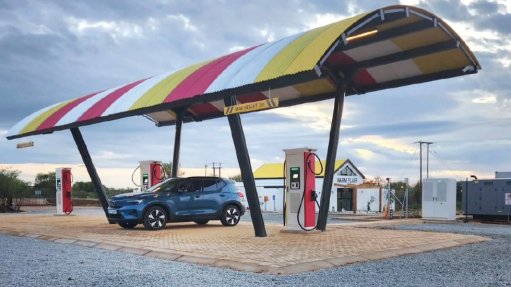Much to gain in Zambia with policy rethink



MAKING HEADWAY Zambia will need to fully address concerns to reinvigorate mining industry
WARREN BEECH The Zambian government has publicly committed to increasing copper production
Zambia, although well positioned to benefit from the increased demand for minerals that support the green economy, needs to improve its regulatory framework and ease of doing business, among other challenges, to fully leverage its resources, according to law firm Beech Veltman CEO Warren Beech.
The global mining and natural resources sector has been facing significant challenges such as irregular commodity demand cycles, stringent measures implemented because of the Covid-19 pandemic, supply chain constraints, increased costs of production, and regulatory and policy uncertainty.
However, he says Africa is in a unique position to take advantage of the growing demand for minerals that support the global transition to a green economy and the associated increased investment.
Africa has vast untapped reserves of battery minerals, including copper.
“The Russia-Ukraine war has emphasised just how important access to alternative energy sources is, and this is good news for African counties with reserves of the battery minerals, liquified natural gas and green hydrogen,” says Beech.
The global commitment to decarbonisation provides African countries with an opportunity to benefit from direct exploration, mining activities, local beneficiation, infrastructure development, socioeconomic growth and revenue.
However, despite having vast mineral resources, African countries have not benefited as much as they could have, owing to policy and regulatory uncertainty.
Beech also notes that concerns surrounding the security and integrity of operations and personnel, infrastructure constraints, political instability, regime changes and concerns surrounding nationalisation, nationalism and the integrity of ownership of mining assets have also impacted on many countries’ ability to attract investors.
Legal Hurdles
A significant challenge facing the mining sector in Zambia is the high tax regime, which deters investors, and is one of the highest in the world, says Beech.
However, taxes are not the only factor influencing investor decision-making in the mining sector.
The highly complex set of laws applicable to the mining and natural resources sector, and energy constraints in the form of electricity rationing, also make investors cautious. Further, the very public dispute between Konkola Copper Mine and the Zambian government remains a concern as it creates uncertainty around governmental action and how quickly disputes can be resolved.
To mitigate these challenges, Zambia needs to stabilise the tax regime and provide the necessary certainty. While there has been a concerted effort to address the uncertainties regarding royalties and taxes, including through the amendments made in the Mines and Minerals (Amendment) Act, which came into effect on January 1, 2023 and which now see royalty percentages and scales benchmarked against the monthly average London Metals Exchange cash price per ton, the full impact of these efforts is yet to be seen.
Zambia has also announced its intention to significantly increase the volume of copper that will be produced and exported in 2023.
To achieve this, two of the largest mines – Konkola copper mine and Mopani copper mine – must resume mining operations and reach steady state nameplate production as a matter of “extreme urgency”, says Beech. Going forward, legacy issues surrounding these mines will need to be addressed if the increased volumes are to be achieved.
Additionally, the current electricity rationing will have to be reduced significantly. The signing of the Joint Development Agreement between the Zambian State-owned electricity company Zesco and the United Arab Emirates renewable-energy company Masdar to develop solar projects worth $2-billion may address the current electricity crisis, he notes.
Beech emphasises that improving the regulatory framework and ease of doing business, and addressing critical economic reforms, are crucial for the country’s mining sector to thrive.
Addressing these concerns will attract investors, increase the country’s revenue and benefit the Zambian people, he says.
Pursuing Growth
“The change in presidency in Zambia with the appointment of President Hakainde Hichilema shows just how important a strong leader can be, and the changes under his leadership are already starting to show positive results,” says Beech.
Investing in cross-border infrastructure development can also benefit individual countries and regions. It is, therefore, essential for Zambia to take a regional approach to infrastructure development to increase the efficiency of the transportation of minerals and goods.
The mining sector’s success in Zambia is crucial for the country’s economic growth and development. It has vast mineral resources, and the mining industry has the potential to contribute significantly to the country’s socioeconomic growth and development, explains Beech.
Beneficiation Efforts
“While the Zambian government has publicly committed to increasing copper production, the copper beneficiation facilities cannot accommodate this increased production,” explains Beech.
An export tax of 10% was imposed on the export of unrefined copper ore from Zambia to facilitate and encourage local beneficiation.
Moreover, mining companies, particularly the copper mines, are paying high holistic taxes, with the current global copper price of $9 000/t having resulted in the maximum royalties payable to the State.
Consequently, Zambian copper mines want to increase production, and investors want to invest in copper mining, to benefit from the super cycle, he notes.
However, the combination of a high copper price and constrained local beneficiation, as well as high royalty and export taxes, puts the Zambian copper mining industry at risk and may prevent the country from benefiting fully from the current copper price.
Government Efforts Meanwhile, the Zambian government, on June 21, 2022 stated that it will review the Mines and Minerals Acts to actualise the country’s potential. Speaking when he officially opened the Lusaka provincial consultation on the mineral resources development policy, Mines and Minerals Development Minister Paul Kabuswe said the ministry was eager to engage key stakeholders to incorporate their ideas and submissions in implementing all policies. He added that there was need to replace the 2013 Minerals Development Policy which is currently being used despite the sector evolving and experiencing new challenges. Further, Centre for Trade Policy and Development head of research Boyd Muleya said in June 2022 that implementation of good minerals development policies was crucial for the Zambian government and important for industrial linkages. He said such engagements will attract investments in mining because all stakeholder’s concerns are considered before the final document is completed. Kabuswe also wants to increase prospecting in the country. In this regard, he engaged the United Nations Development Programme (UNDP) to supplement Zambia’s existing exploration programmes aimed at fully exploring and mapping the country’s mineral deposits. UNDP Zambia resident representative Lionel Laurens responded, assuring Kabuswe of UNDP support, highlighting existing support to the artisanal miners through innovation. Laurens added that training for small scale and artisanal miners has been scaled up across the Zambia.
Comments
Press Office
Announcements
What's On
Subscribe to improve your user experience...
Option 1 (equivalent of R125 a month):
Receive a weekly copy of Creamer Media's Engineering News & Mining Weekly magazine
(print copy for those in South Africa and e-magazine for those outside of South Africa)
Receive daily email newsletters
Access to full search results
Access archive of magazine back copies
Access to Projects in Progress
Access to ONE Research Report of your choice in PDF format
Option 2 (equivalent of R375 a month):
All benefits from Option 1
PLUS
Access to Creamer Media's Research Channel Africa for ALL Research Reports, in PDF format, on various industrial and mining sectors
including Electricity; Water; Energy Transition; Hydrogen; Roads, Rail and Ports; Coal; Gold; Platinum; Battery Metals; etc.
Already a subscriber?
Forgotten your password?
Receive weekly copy of Creamer Media's Engineering News & Mining Weekly magazine (print copy for those in South Africa and e-magazine for those outside of South Africa)
➕
Recieve daily email newsletters
➕
Access to full search results
➕
Access archive of magazine back copies
➕
Access to Projects in Progress
➕
Access to ONE Research Report of your choice in PDF format
RESEARCH CHANNEL AFRICA
R4500 (equivalent of R375 a month)
SUBSCRIBEAll benefits from Option 1
➕
Access to Creamer Media's Research Channel Africa for ALL Research Reports on various industrial and mining sectors, in PDF format, including on:
Electricity
➕
Water
➕
Energy Transition
➕
Hydrogen
➕
Roads, Rail and Ports
➕
Coal
➕
Gold
➕
Platinum
➕
Battery Metals
➕
etc.
Receive all benefits from Option 1 or Option 2 delivered to numerous people at your company
➕
Multiple User names and Passwords for simultaneous log-ins
➕
Intranet integration access to all in your organisation



















